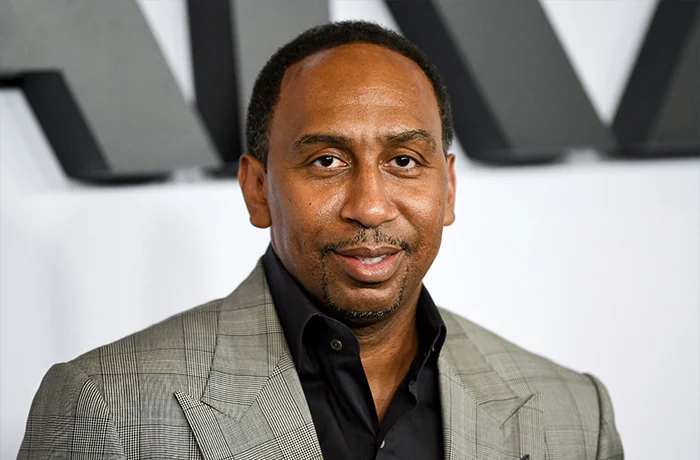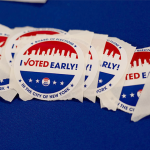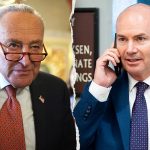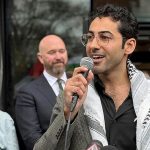In the immediate wake of former Vice President Kamala Harris‘s loss to President Donald Trump in the 2024 election, you wouldn’t find too many political pundits with a 2028 Democrat candidate bingo card ready to highlight an ESPN talking head. Still, less than five months into Trump’s second, nonconsecutive term, Stephen A. Smith‘s name is being passed around as a nominee to take on Vice President JD Vance or his Republican 2028 equivalent.
Smith, 57, is a longtime provocateur and gadfly for multiple daily TV and satellite radio sports talk shows. His often solemn and stern evaluation of NBA or NFL events launches heat-seekers to whomever his employers pose opposite him for the argument of the hour. A former sportswriter for the New York Daily News and Philadelphia Inquirer, Smith also vented his controversial rhetoric at Fox Sports and Sirius Mad Dog Radio. Now settled in at ESPN full-time, multiple media reports have scored his latest five-year contract at $100 million.
Though known for ranting about every ball that bounces, Smith is not entirely new to political commentary. His sports writing and broadcast positions often raise questions about everything from racial fairness to gender relations to economic equality.
With the Democratic Party lost in the wilderness after its rival’s sweeping 2024 victory, and entangled in the messy cover-up of former President Joe Biden’s mental decline, Smith’s constant media presence and charisma have some wondering if he could be the Democrats’ Trump — the media-savvy outsider to capture the imagination of a jaded voting public. Though Smith laid out strict conditions for moderating the Democratic platform before he would consider such a run for office, he hasn’t entirely shot down the possibility.

Smith declined to be interviewed for this report, and most political experts believe his presidential inauguration is highly unlikely given his complete lack of executive experience.
Daniel T. Durbin, director of the University of Southern California’s Annenberg Institute of Sports, Media and Society, believes Smith’s flirtation with Pennsylvania Avenue is little more than an ego trip. Still, he reminded politicos that Trump’s 2016 run seemed like a similar narcissistic exercise until bland Republican opposition opened the door to the nomination.
“There’s always an appeal to an outsider candidate,” Durbin said. “An outsider candidate can run against Washington because Washington is portrayed as the problem.”
Durbin agreed that Trump changed the rules as an outsider from the celebrity realm.
“(Trump’s) claims to fame outside of his real estate dealings were being in the WWE and having a TV show,” Durbin explained. “He thrived on celebrity. The people who are trying to grab the latest celebrity to run as president like Stephen A. Smith miss the point that Donald Trump was talking about politics since the 1980s — always touting the idea that he’d be a better president than whomever held the office — running against Washington for the better part of 40 years. You don’t have that with Stephen A. Smith.”
S. Mark Young, the sports and entertainment business chairman for the Marshall School of Business at USC, said he understands why some Democrats see Smith as a viable candidate. However, he said he believes the idea plays more to the realm of “politics as a performance.”
“Smith has skills as a strong, intelligent, hard-nosed sports journalist who argues effectively and doesn’t back down from a fight,” Young acknowledged. “He also has strong convictions, and his stinging criticisms of the Democratic Party ring true for many. But is he the Democrats’ answer to Donald Trump? That would certainly be entertaining. In the end, what would be accomplished?”
Young said he sees current U.S. politics as drama divorced from the realization that real people’s lives and livelihoods are in jeopardy, separating the current American zeitgeist from the gravitas much of the rest of the world clings to in its leaders.
“In so many major countries today, political leaders still have top credentials and accomplishments,” he explained. “For instance, Mark Carney in Canada has degrees from Harvard and Oxford, has major banking experience, and worked with the U.N. Keir Starmer of the U.K. went to Oxford and was a top attorney. They are serious people. None of them, to my knowledge, have TV shows.”
Arnold Weinfeld, associate director at Michigan State University’s Institute for Public Policy and Social Research, said he views this era’s favoring of celebrity candidates as a symptom of a voting populace feeling ignored by traditional politicians.
“I think we have seen that the voting public wants to hear from someone that knows them and listens to them and speaks their language,” Weinfeld said. “During this past election, Donald Trump spoke to the voters on two issues that were very important to them — the economy and the migrant issue. He talked directly to them. It’s up to Democrats now to find somebody who can do the same.”
While Weinfeld said he doesn’t believe U.S. elections are ready to move away from traditional politicians entirely post-Trump, he expects the celebrity model still appeals to some party officials. If Democrats really long to nominate their outsider version of Trump, Weinfeld suggested someone in the mold of Mark Cuban might be a more viable choice.
“Remember that Donald Trump is a businessman,” he said. “He’s run something. Mark Cuban has run something. He actually has organizational leadership skills that someone like Stephen A. Smith doesn’t have. I think at the end of the day, that’s what the public wants — someone who ran something successfully.”
Durbin said the buzz around Smith as a possible candidate is celebrity-obsessed Democrats chasing “the latest shiny object.”
“You have the yelling, screaming, ‘tempest in a teapot’ people grabbing at a celebrity because they’re a celebrity,” Durbin added. “Stephen A. Smith is doing the smart thing, and he’s using that to build his brand with all the boisterous statements. But his views have not been consistent with those of current Democrats.”
TRUMP ADMINISTRATION ASKS SUPREME COURT TO STOP ‘INTRUSIVE’ DISCOVERY IN FOIA CASE AGAINST DOGE
Young agreed with Durbin, viewing Smith’s flirtation with the presidency as a less-than-serious political exercise in an era when genuine wisdom matters.
“Politics has become theater, and a great deal of the populace has tuned out because of that,” he said. “What seems to spark interest is more outrageous behavior to keep people entertained. But this is getting us nowhere.”
John Scott Lewinski, MFA, is a writer based in Milwaukee.





















